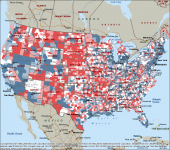 Today I was having a discussion with a British acquaintance on the subject of the death penalty, and it quickly became clear to me that he was making a fundamental mistake in his thinking on America. When Europeans talk about America, I’ve noticed that they tend to misconstruct matters of law and policy because they’re ignorant of America’s system of government. This is important stuff. All a European needs is to hear that “America” has the death penalty, or that it bans gay sex, or that it’s racist and homophobic, and suddenly all America is painted in that colour. This particular gentleman clearly regarded America as one, single entity on the issue, without any regard for the fact that America is actually made up of 50 separate states, all of which have their own laws regarding the death penalty.
Today I was having a discussion with a British acquaintance on the subject of the death penalty, and it quickly became clear to me that he was making a fundamental mistake in his thinking on America. When Europeans talk about America, I’ve noticed that they tend to misconstruct matters of law and policy because they’re ignorant of America’s system of government. This is important stuff. All a European needs is to hear that “America” has the death penalty, or that it bans gay sex, or that it’s racist and homophobic, and suddenly all America is painted in that colour. This particular gentleman clearly regarded America as one, single entity on the issue, without any regard for the fact that America is actually made up of 50 separate states, all of which have their own laws regarding the death penalty.
You see, because European countries tend to make most laws on a nationwide, universal basis, Europeans who don’t know much about American government tend to carry assumptions with them into these discussions. So, with a ignorant, conceited air of superiority, people will reciprocate on how awful this or that American policy is, all the while ignoring the fact that America is a diverse nation with thousands of collaborating jurisdictions and a population that equals three-fifths of that of all European countries added together.
Anyone who denies that it has become wholly trendy to be anti-American in Europe has his head stuck in the sand. It’s just the kind of remark to make if you’re looking for instant belonging in certain sections of European society.
Yet much of America just doesn’t fit the hackneyed stereotype. America’s tiered system of government encompasses many jurisdictions at different levels, each of which are strictly self-governing on many matters and thus are very different – they simply can’t be tarred with the same brush.
At the largest level, you have the federal government, with its three branches, and its laws, courts, police services and other agencies including the military, Border Patrol, National Parks, Marshals, FBI, CIA, IRS, Immigration and many more. Next there are the states, each of which have their own laws, courts, police services, tax departments and other agencies. Then there are the counties within each state, all of which have their own laws, courts, sheriff’s department, tax department and other agencies (like State Parks, highway patrols, and more). Finally there are cities and towns, each of which have their own local laws, courts, police departments, tax departments (including SVUs, SWAT, etc.) and other agencies (like animal control, sewage districts and such). That’s not to mention Indian Reservations, which are their own jurisdictions too, and are managed by a federal agency.
This very foundational, multi-level system produces a plethora of different results depending on what the voters in any of its distinct parts might want. Thus being homosexual in San Fransisco may be easier than being homosexual in Alabama, being a gun owner may be easier in Arizona than in New York, and being an advocate for the death penalty might be a happier thing in Texas than it would be in Seattle.
It’s a consequentially libertarian manner with which to do government; and a manner which leaves many choices for an American citizen. Many Americans move around a lot and experience life in the many parts of their diverse nation: upon moving here I thought I’d be the exception but it turns out that I am the rule – most of the other inhabitants of my town came from elsewhere too; they weren’t born here. Americans move around, often over distances of thousands of miles from where they grew up, in order to find a community that embodies the kind of values they share.
So when I come to a conversation like the one I had today with my British acquaintance, one of the first things I do is to correct any insistence that “In America…” this or that is the case. No, it’s the case in X out of Y jurisdictions. And sometimes X is a statistically insignificant figure. For instance, an anonymous comment on W&T yesterday implied that perhaps people like me shouldn’t talk about prison policy since, “in the USA” there is a “loony tune idea” which forces prisoners to wear pink underwear. Is it true? Yes. One sheriff out of three-thousand, one-hundred and forty-one decided that the inmates in his charge should wear pink, because he thought it would make jail that much more unappealing (Sheriff Joe Arpaio, Maricopa County, AZ). So has America spoken? Is this now an “American” idea?
Of course, there are some issues upon which all of America is represented. On foreign policy, for example. And – let’s face it – foreign policy is the primary issue on which Europeans oppose the United States. I’d like to think things will change on that matter soon.
In the meantime, my European friends, remember that “In America…” is often a misnomer.

